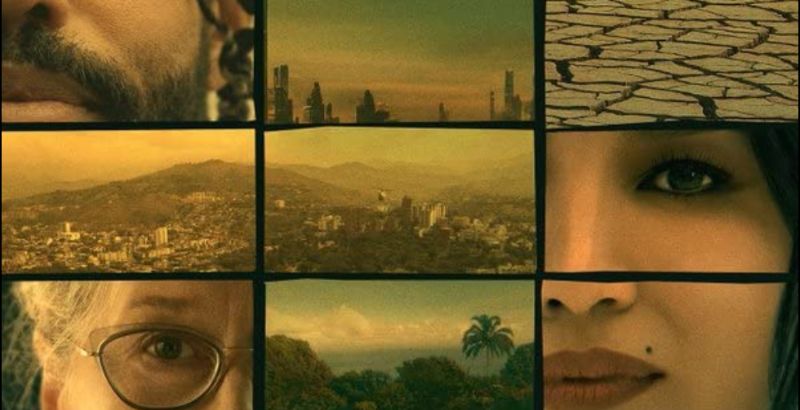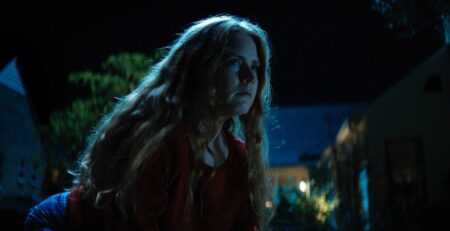
Climate catastrophe is upon us, and the anthology series Extrapolations from Scott Z. Burns and Apple TV+ is here to give us the starkest reminder possible that the time is now or never to reverse course. And it’s probably already too late. With 8 star-studded episodes, the show examines life on Earth over several near-future decades through the eyes of the people inhabiting it. Starting with one episode introducing us to the near-future world and then branching off into seven largely one-off stories, it’s an uneven but ultimately profound examination of the moral questions we might find ourselves contemplating while the world burns around us.
The show kind of feels like it’s broken into two halves, tonally. The first half is in the rather near future, so the technology isn’t so far-flung, but the consequences of climate change are still stark. One of the few episodes focuses on a mother who researches whales for a corporation and her son who has a debilitating climate-exacerbated heart disease. Another hones in on a rabbi in Miami, his flooding congregation, and the wisdom of a Bat Mitzvah student. Every episode for the whole season is as intimate as this, which makes the stories all the more gripping and grounded. But as the back half of the show travels further in time and demonstrates all kinds of hard-to-believe future technologies, the impact of its intimacy is dampened by the farfetched ideas. It still does a good job of asking relatable moral questions regardless of the time period, Extrapolations just becomes harder to relate to as the technology evolves beyond comprehension.
These moral questions are always very well-propositioned and largely well-explored. The biggest theme throughout the show is wondering whether it’s more imperative to focus on immediate actions to prevent immediate climate-spurred disasters, or if our long-term security is more essential to our species and thereby, short-term risks must be taken. In some episodes, this means contemplating the value of underwater mining for battery materials so we can build the batteries necessary to scale clean energy sources. Or, whether it’s morally right to take advantage of the last animals on earth so they can be preserved for future genetic replication and repopulation. Or, the eternal question: whether it’s the responsibility of individual consumers to change the course of global consumption, or the responsibility of governments and corporations to act against their rational interests to do so?
The show is also at its best when it asks these questions in specific but not exact ways. References to real-life figures or real-life political conflicts like a Secretary Rubio or an amicable Two State Solution between Israel and Palestine feel too pointed, too on the nose, or too much of a prediction with no justification, whereas threats of war between specific nations or an imaginary global climate summit named after the most recent real-life summit feel plausible in their avoiding being too referential to real life. Nobody ever utters the name Musk, thankfully, just “tech billionaires.” The show already has one of its own in Kit Harington’s Nick Bilton anyway.
Of course, what drew me the most to Extrapolations was Daveed Diggs’ depiction of Rabbi Marshall Zucker. To briefly complain about the depiction itself, it shocked me first and foremost that the synagogue he works at is a real synagogue in Miami Floria likely contemplating the risks and realities of rising water levels. Reform Jewish communities, which this synagogue is at least in real life, don’t go around referring to God as “Lord” these days the way that Zucker does, which felt odd. That’s a very pre-modern kind of a language you’d have seen in decades past, but by today, our language for God tends to be a-gendered and minimizes language that can be construed as God holding us captive as a “Lord” or “Master.” Surely by another two decades from now this will remain true.
But far more importantly, this episode struck me as one of the single greatest depictions of core challenges that Jewish communities, and likely so many other faith-based communities must consider in the face of climate catastrophe: can our community thrive without our build spaces, is our personal security more important than the security of the community at large, and how do we put our faith into action when the state of the world makes faith so impossible to hold onto? Most episodes get into this level of depth about their moral quandaries and most left me genuinely unsure how to feel or how to proceed, especially in the more grounded first half of the show.
Extrapolations is uneven in how grounded it feels, but between its absolutely star-studded cast and the painful questions it forces us to consider, I believe it’s a well worth-watching show. It’s not interesting in answering too many questions about how we solve the crisis; but rather, forces you to grapple with the many stark realities we will have to face and painfully difficult questions we will have to answer if nothing changes between now and then. It constantly reminds you that no matter how advanced our society might get technologically, it will always be shackled by inequality, discrimination, and greed. Some of those lessons are too on the nose, but on the whole, they’re well-demonstrated.
Extrapolations premieres its first three episodes on March 17th on Apple TV+ with new episodes airing on Fridays.
Extrapolations
-
Rating - 7/107/10
TL;DR
Extrapolations is uneven in how grounded it feels, but between its absolutely star-studded cast and the painful questions it forces us to consider, I believe it’s a well worth-watching show.




